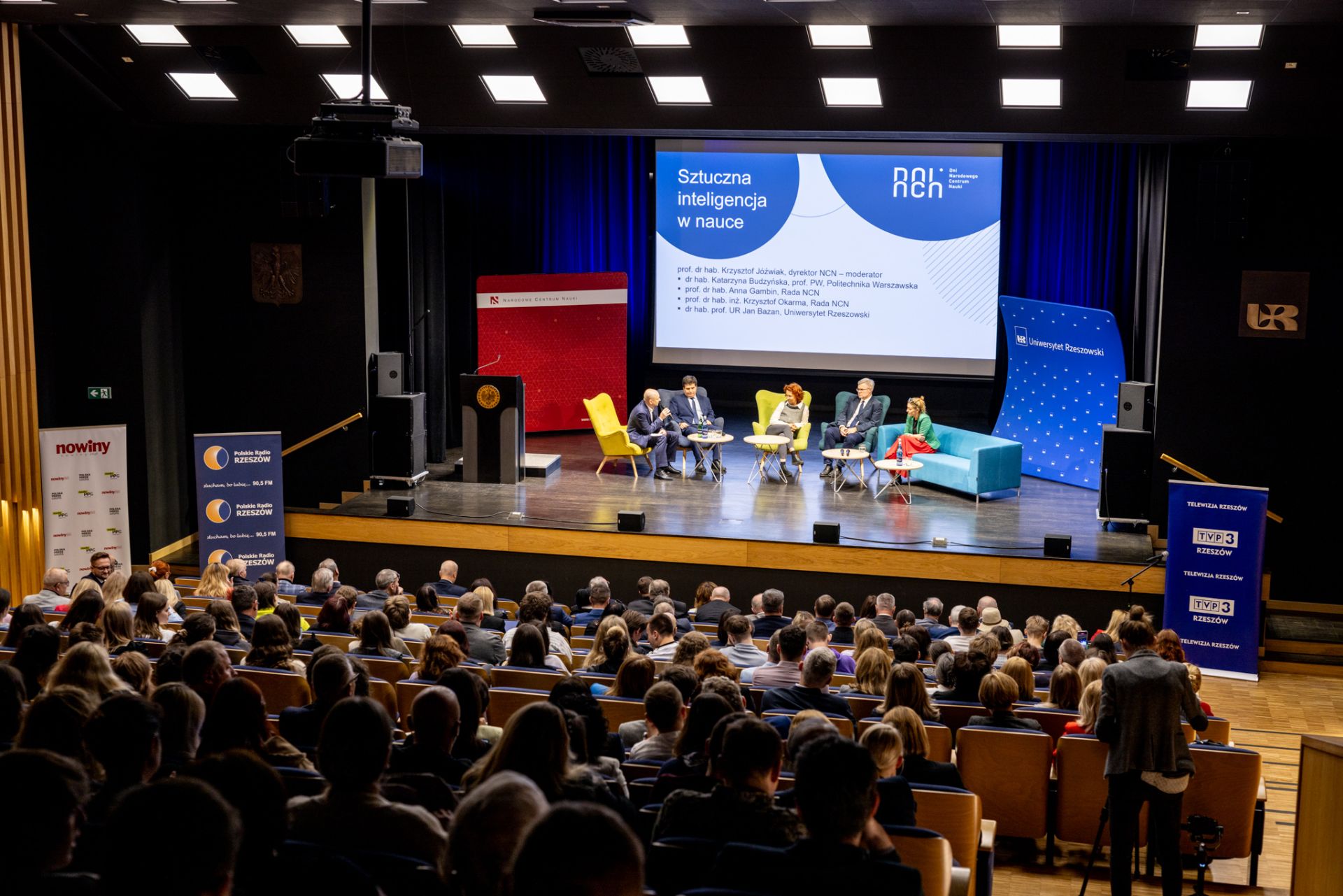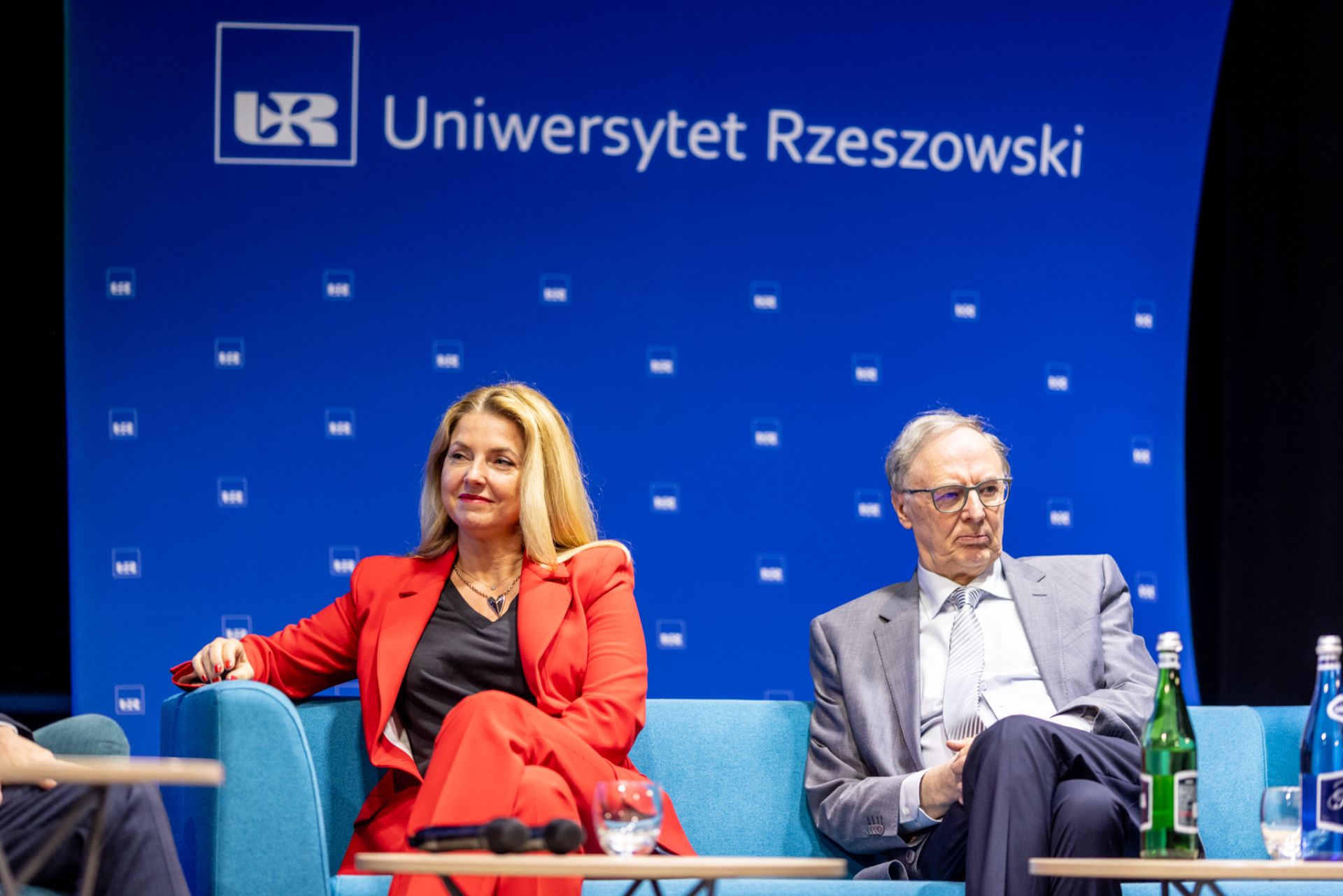On 12 and 13 May, the academic community from Podkarpacie discussed the trends in science, AI’s impact on research, global approach to research, mobility, and interinstitutional and international collaboration. The NCN Days in Rzeszów are now over.
 Prof. Krzysztof Jóźwiak, prof. Adam Reich, Prof. Jolanta Szempruch podczas konferencji prasowej otwierającej Dni NCN 2025 w Rzeszowie
The NCN Days are held on an annual basis, each time in a different academic city in Poland. The science festival features a great many inspiring meetings, interesting lectures, lively discussions, courses and workshops due to which researchers can improve their application skills. Why is basic research so important? How does it help us address challenges facing the contemporary world? These issues were addressed in discussions with researchers from Rzeszów, representatives of regional and local governments, professionals from the academic research centres in charge of project administration and officers in charge of research data management.
Prof. Krzysztof Jóźwiak, prof. Adam Reich, Prof. Jolanta Szempruch podczas konferencji prasowej otwierającej Dni NCN 2025 w Rzeszowie
The NCN Days are held on an annual basis, each time in a different academic city in Poland. The science festival features a great many inspiring meetings, interesting lectures, lively discussions, courses and workshops due to which researchers can improve their application skills. Why is basic research so important? How does it help us address challenges facing the contemporary world? These issues were addressed in discussions with researchers from Rzeszów, representatives of regional and local governments, professionals from the academic research centres in charge of project administration and officers in charge of research data management.
The NCN Days were opened by the Rector of the University of Rzeszów Prof. Adam Reich who co-organised and hosted the event. Prof. Reich held that the during the NCN Days researchers and research-funding institutions could exchange experiences. He emphasised the importance of research for teaching and pointed out that science had to break out of university walls, be interdisciplinary and international. The Minister of Science Marcin Kulasek addressed the audience in a letter read out by Kinga Kurowska-Wilczyńska, Deputy Director of the Science Department at the Ministry of Science and Higher Education. The letter included appreciation of NCN’s support for Polish science around the world.
“Basic research is the essence of science. Fundamental research fuels discoveries that give rise to future innovations and social changes, operation of the state and the world, and influences our future,” underlined the NCN Director Prof. Krzysztof Jóźwiak.
AI in Science
The programme included discussions on new technologies in research. The first part of the event was devoted to the use of AI in science and how it changes research performance. The lecture “AI and science: Are the new technologies bringing us closer to the truth?” was delivered by Prof. Katarzyna Budzyńska from the Warsaw University of Technology.
 Panel dyskusyjny: Sztuczna inteligencja w nauce
The panellists reflected on the current use of AI in research, as well as current and potential opportunities and threats of AI in science.
Panel dyskusyjny: Sztuczna inteligencja w nauce
The panellists reflected on the current use of AI in research, as well as current and potential opportunities and threats of AI in science.
The NCN Council member Prof. Anna Gambin from the University of Warsaw emphasised that quantity and quality of input data was critical to AI which handled large dataset analysis well and could effectively support various processes but fell short when analysing rare or single cases, e.g. to support diagnosis of rare diseases. Prof. Krzysztof Okarma from the West Pomeranian University of Technology in Szczecin, NCN Council member and representative of physical sciences and engineering, spoke about large language models (LLMs) and their industrial applications, and emphasised explainability for LLMs: AI users wanted to know the operational mechanisms of the algorithm and the source of its input data to understand how the neural network generated its outputs. Dr hab. Jan Bazan, professor at the University of Rzeszów referred to the legal aspect of AI in research and Prof. Katarzyna Budzyńska stressed the need to create legal and methodological standards in this area. The discussions were moderated by the NCN Director Prof. Krzysztof Jóźwiak.
International Aspect of Science and Open Research Data
In the second part, the international aspect of research was discussed, as well as open research data. The opening lecture by Dr hab. Anna Siewierska from the University of Rzeszów addressed the global approach to research and its rationale, as well as cultural, disciplinary, political and ideological impact on the global approach.
 Dr hab. Anna Siewierska, prof UR, prof. Tomasz Dietl
Dr hab. Anna Siewierska, prof UR, prof. Tomasz Dietl
The panel discussion moderated by Prof. Małgorzata Kossowska from the Jagiellonian University addressed the need to create long-term strategies for international science and open science support.
Prof. Tomasz Dietl from the Institute of Physics of the Polish Academy of Science, Chair of the NCN Council, said that global approach to research enhanced its quality and visibility and pointed out the importance of Polish researchers’ participation in European programmes. Prof. Jarosław Sęp from the Rzeszów University of Technology joined the discussion with insights from the managerial perspective and underlined the importance of developing institutional mechanisms to support international collaboration, e.g. project support offices. Prof. Przemysław Marciniak from the University of Silesia (NCN Council member) stated that the global approach to research must not be merely about Polish scientists going abroad but also about attracting foreign researchers to Poland. Dr Aneta Pazik-Aybar from the Open Science Team at the NCN discussed the NCN’s role in promotion of open access to publications and research data, and pointed out challenges facing implementation of open science policy in the Polish research practice.
The panellists agreed that not only research infrastructure was needed to enhance the international landscape of Polish science but researchers’ mobility, competencies to cooperate with foreign partners and international partnerships. Open access to research data and data transparency were mentioned as foundations for trust and progress in science.
NCN Grants for Research: Procedures and Tips
On 12 May, an open meeting with the NCN Council (NCN Grants: Facts and Myths) was held to discuss the NCN grant application process and the most common concerns and problems reported by researchers working in Poland.
The panel discussion was hosted by the NCN Council members Prof. Bogumił Szady, Mariola Łaguna, Piotr Skarżyński and Renata Ciereszko. The scientific community from the Podkarpacie region was represented by Prof. Monika Stompor-Gorący and Dr hab. Tomasz Piechowiak from the University of Rzeszów.
The panellists addressed questions about the most important aspects of grant proposals, positive approach to the unsuccessful applications and procedural changes with regard to project performance expected by the scientific community.
Prof. Bogumił Szady from the John Paul II Catholic University of Lublin, Chair of the NCN Council’s Committee for Regulations and Procedures emphasised the value of team work in the development of proposals. “It is a big mistake to write proposals individually. They should be consulted with other researchers and team work in the application process is essential, especially if researches from other research centres were also involved.”
According to Prof. Szady, writing a proposal could be an intellectual adventure worth undertaking, no matter what the outcome is. “I can say from experience that writing a proposal, preparing a project, cooperating on key theses, ideas and literature search alone can add to an intellectual adventure worth undertaking, even if one fails,” he said and added that “good projects should result in a publication even if they are refused funding.”
Prof. Mariola Łaguna from the John Paul II Catholic University of Lublin said that scientists’ decision not to apply was often due to their fear of being judged by colleagues from other domestic research institutions which was unreasonable in the context of NCN calls. “Funding proposals are usually evaluated by foreign experts and reviewers (…) This is an opportunity to be evaluated by foreign scientists working in a similar research domain and have one’s achievements and activity promoted,” Prof. Łaguna emphasised and encouraged researchers to apply early enough, as doctoral students. Prof. Monika Stompor-Gorący said that it was vital to encourage early career researchers. “I was lucky enough to grow in a grant culture, having joint a team funded by the National Science Centre almost from the very beginning of its formation,” she said and added that mentors and grant winners were crucial for the promotion of grant culture and should include young people - grantees and doctoral students - in their projects.
Prof. Piotr Skarżyński from the Medical University of Warsaw and the Institute of Physiology and Pathology of Hearing underlined that valid career planning had to acknowledge both achievements and failures as integral parts of professional growth. “It is good to learn from your own mistakes but learning from somebody else’s mistakes is even better. I often meet people who apply and fail, just to learn from their mistakes,” he emphasised and highlighted the importance of team work. “It is great if you have someone to review your proposal. Proposals should be written together with other researchers to make sure they are valid,” he said.
The panellists discussed deregulation and flexibility of project implementation, especially in terms of project budget management, as well as support for smaller research centres where the NCN Days could level the playing field.
Workshops
The NCN Days included workshops during which nearly 150 researchers and administrative professionals could improve their project planning skills and learn how to draft proposals, budgets and data management plans.
The National Science Centre organises regular online info meetings, courses and workshops for applicants, data management courses and workshops, and workshops for researchers operating research projects. Please follow us on our website.
On 12 and 13 May, the University of Rzeszów hosted the NCN Days.
This year, the event was initiated and co-organised by the University of Rzeszów and supported by the City of Rzeszów, Regional Labour Office, HE institutions and universities from the region, including the State University of Applied Sciences in Jaroslaw, State University of Applied Sciences in Krosno, State Vocational University of prof. Stanisław Tarnowski in Tarnobrzeg, State University of Applied Science in Przemyśl, Rzeszów University of Technology, Jan Grodek State University in Sanok, University of Information Technology and Management in Rzeszów, WSPiA Rzeszów School of Higher Education, and Podkarpackie Centre for Innovation (CTI).
Media coverage: Forum Akademickie, Nauka w Polsce PAP, nowiny24.pl, Polskie Radio Rzeszów, Radio Via, TVP Info and TVP3 Rzeszów.
